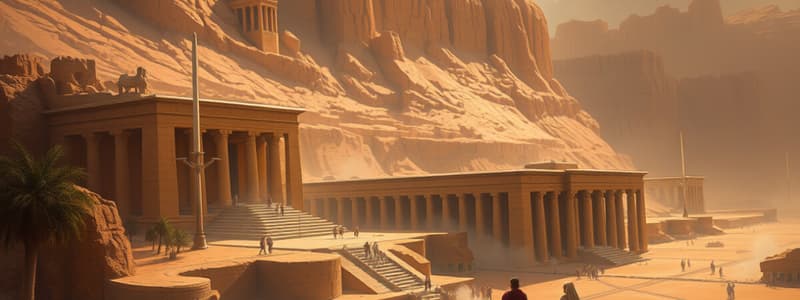Podcast
Questions and Answers
What does Mesopotamia mean?
What does Mesopotamia mean?
Mesopotamia is a Greek word meaning 'between the rivers'.
What two rivers was Mesopotamia between?
What two rivers was Mesopotamia between?
The Tigris and Euphrates.
How did the Mesopotamians advance to civilization?
How did the Mesopotamians advance to civilization?
Individual farms became farming villages, villages evolved into towns, towns grew into cities, and cities produced civilization.
What is Northern Mesopotamia made up of?
What is Northern Mesopotamia made up of?
What did early settlers in Northern Mesopotamia farm and use?
What did early settlers in Northern Mesopotamia farm and use?
What characterized Southern Mesopotamia?
What characterized Southern Mesopotamia?
What were the characteristics of the Ubaidians?
What were the characteristics of the Ubaidians?
Who were the Sumerians?
Who were the Sumerians?
Who were the Assyrians?
Who were the Assyrians?
What is an important symbol in Mesopotamian culture?
What is an important symbol in Mesopotamian culture?
Who were the Akkadians?
Who were the Akkadians?
What characterized Sumerian society?
What characterized Sumerian society?
Who were the Amorites?
Who were the Amorites?
Who were the ancient Mesopotamian people?
Who were the ancient Mesopotamian people?
What is the Fertile Crescent?
What is the Fertile Crescent?
Which ancient civilizations inhabited areas within the Fertile Crescent?
Which ancient civilizations inhabited areas within the Fertile Crescent?
What is a ziggurat?
What is a ziggurat?
What is cuneiform?
What is cuneiform?
What does Semitic refer to?
What does Semitic refer to?
What is Enuma Elish?
What is Enuma Elish?
Who is Gilgamesh?
Who is Gilgamesh?
What is Uruk?
What is Uruk?
Who was Sargon the Great?
Who was Sargon the Great?
Who was Hammurabi?
Who was Hammurabi?
Flashcards are hidden until you start studying
Study Notes
Mesopotamia Overview
- Mesopotamia translates to "between the rivers," referring to its location between the Tigris and Euphrates rivers.
- The region, mainly in modern Iraq, also extends into parts of Syria.
Geographic Divisions
- Northern Mesopotamia: Characterized by hills and fertile plains; benefited from seasonal rains, rivers, and nearby mountains for farming resources.
- Southern Mesopotamia: Composed of marshy and barren plains; agriculture depended on irrigation from rivers due to scarce natural resources.
Early Cultures and Societies
- Ubaidians (circa 5500 BCE): Pre-urban culture with large villages, early temples, and agriculture based on wheat, barley, and livestock. Key sites included Lagash, Eridu, and Ur.
- Sumerians: Innovators of urbanization and technology during the Bronze Age, developed writing and epic literature, established city-states, and had the first monarchy.
- Assyrians: Known for their brutality, centered in the city of Ashur.
- Akkadians: Conquered Sumerians around 2000 BCE, adopted Sumerian culture, and spoke a Semitic language. Famous for building ziggurats.
Important Symbols and Cultural Aspects
- Mountains symbolize the mysterious forces of life, rain, and fertility in Mesopotamian religion.
- Ziggurat: A rectangular stepped tower serving as temples to ancient gods, constructed from mud brick.
- Cuneiform: The system of writing first developed by the Sumerians.
Additional Cultural Insights
- Ancient Mesopotamian civilizations include Sumerians, Akkadians, Assyrians, and Amorites.
- The Fertile Crescent: An area with fertile soil and rivers, crucial for ancient civilizations, stretching from the Nile to the Tigris and Euphrates.
- Significant figures included Sargon the Great, who united city-states, and Hammurabi, known for uniting southern Mesopotamia and creating one of the earliest legal codes.
Mythology and Literature
- Enuma Elish: A creation myth illustrating the struggle between cosmic order and chaos, symbolizing seasonal cycles.
- Gilgamesh: A historical king of Uruk, notable for one of the earliest literary works written in Sumerian on clay tablets.
Uruk
- An ancient city of Sumer and later Babylonia, located east of the present Euphrates river channel.
Studying That Suits You
Use AI to generate personalized quizzes and flashcards to suit your learning preferences.




